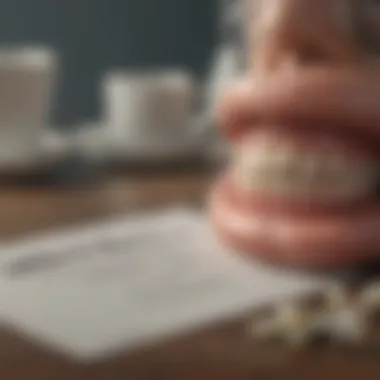Does Original Medicare Include Dentures Coverage?


Intro
Navigating the intricacies of health insurance can be challenging, particularly when it concerns dental care under Original Medicare. Many individuals reaching retirement age or those new to Medicare might wonder about the program's provisions for dentures and dental services. This inquiry is crucial, given the potential costs associated with dental care.
Understanding whether Original Medicare covers dentures is profound as some may have expected benefits only to find out they are not included. This article illuminates the key aspects of coverage options, alternatives, and strategies for obtaining the necessary support for dental health.
Overview of Insurance and Credit Card Options
Although dental care is often seen as a separate avenue of health care, aligning this with insurance and payment mechanisms is essential. A variety of financial pathways exist to assist those requiring dentures, while helping to clarify Medicare’s limitations.
Types of Insurance Products
It is important to note that while Original Medicare, under Parts A and B, does not cover dentures except in specific medical circumstances, other insurances can provide assistance. Here are some types of insurance products to consider:
- Medicaid: Depending on the state, Medicaid may cover part of the costs associated with dentures. Eligibility typically varies and requires an assessment of both income and health needs.
- Dental Insurance Plans: Certain plans strictly offer dental coverage, with varieties such as preferred providers and fee-for-service plans allowing better access to dentists.
- Medigap: These supplementary plans can assist with out-of-pocket expenses but generally do not include dental benefits.
Credit Card Categories
Credit cards can serve a valuable function when immediate dental procedures arise. Here are some categories of credit cards to consider:
- Dental Financing Credit Cards: Specific cards may provide promotional financing options tailored for dental expenses; pay attention to interest rates after the promotional period ends.
- General Rewards Cards: Many cards also offer cash back or rewards which could indirectly help reduce medical costs by equating their value to dental expenses.
- Low-Interest Rates Cards: Cards with lower interest rates may help manage dental payments more effectively, allowing patients to spread costs over time.
Comparative Analysis
A critical examination of existing options informs strategizing one's specific needs within dental care.
Comparison of Insurance Plans
Not all insurance plans are created equal in terms of coverage and fees. When evaluating different insurers, consider:
- Coverage Range: Established plans vary tremendously in what dental services they cover—from routine exams to extensive procedures such as dentures.
- Monthly Premiums: Buyers should estimate monthly payments against expected dental care usage.
- Provider Networks: Ensure that certain dentists sign within a plan to have reliable service.
Credit Card Comparison
When examining credit cards for dental Joe coverage, contrast features carefully:
- Interest Rates: Account for how much extra may accrure due to interest if balance isn’t fully paid.
- Fees: Annual fees could offset rewards or benefits.
- Repayment Implications: Assess payment considerations to prevent debt traps.
Expert Insights and Recommendations
Insights from healthcare professionals provide clarity on suitable approaches for dental care.
Industry Expert Opinions
Dentists and financial experts commonly suggest verifying all insurance options thoroughly. every patient’s needs are unique, leading variances of coverage. Many providers believe taking precautionary measures far outweigh their impulsive costs.
Data-Backed Recommendations
- Engage with insurance agents to discuss extensive, detailed options.
- Research local dentists to narrow choices to those accepting insurance and offering reasonable payments.
- Prioritize financial literacy regarding credit cards fabricating danger limits for preventively managing costs.
Strategies for Financial Decisions
Navigating finances amidst a spectrum of options requires clear and strategic methodologies.
How to Choose the Right Insurance
Consider the following factors to assess which plan fits best:
- Your current dental health.
- Type of coverage and necessity for possible procedures.
- Financial capability for monthly payments vs. potential procedures.
Maximizing Credit Card Potential


Users should examine credit card user agreements, monitor terms judiciously, balance payouts, and track reward opportunities. A credit card used wisely can significantly enhance one's overall options towards dental engagements.
Resources for Additional Learning
Deepening one’s understanding of Medicare and dental coverage offers valuable insights:
- Tools and Calculators: Use tools like Medicare.gov to calculate what is available based on individual circumstances.
- Further Reading and Educational Material: Additional reading includes resources at Wikipedia’s pages on Medicare, and necessary state programs.reddit.com provides useful user-generated discussions for personal experiences with coverage.
The nuances of Medicare can be difficult to interpret. Keep every detail in mind while making significant financial decisions.
Overview of Original Medicare
Original Medicare is a critical part of the U.S. healthcare system, providing essential coverage for millions of Americans. Understanding its structure and components is crucial, especially for those examining denture coverage. Many beneficiaries rely on this program for their health needs as they age or manage chronic conditions.
Structure of Original Medicare
Original Medicare has two main components: Part A and Part B. Part A, often called hospital insurance, covers inpatient hospital stays, as well as skilled nursing care, hospice, and some home health services. Conversely, Part B consists of medical insurance. It covers outpatient services, preventive visits, and some physician visits. Together, these two parts create a framework that addresses many medical needs but leaves considerable gaps in areas like dental care.
Components of Original Medicare Parts A and B
- Part A - Generally, this part is premium-free for those who have paid Medicare taxes for a certain period.
- Part B - This requires a monthly premium, which can vary per income.
- Coverage Limits - Important to note that while Medicare covers many health services, there are significant limitations, particularly with outpatient dental services.
In understanding these components, one can navigate what Original Medicare offers and, more importantly, what it does not. This lays the groundwork for ongoing discussions about dental coverage and the financial implications related to dentures.
Dental Coverage Under Original Medicare
Understanding dental coverage in the context of Original Medicare is fundamental. Many beneficiaries, assuming some form of dental support, often find themselves perplexed by the limitations imposed. Medicare offers important benefits for healthcare, but unfortunately, it does not typically cover routine dental services. This lack of coverage leaves significant gaps for those needing dentures or any other dental procedures.
It's crucial to grasp the implications of this ineligibility when planning healthcare expenditures. Without coverage for routine dental care, individuals may find themselves facing out-of-pocket expenses that can quickly accumulate. Consequently, exploring alternative dental plans often becomes necessary. This section highlights complications, making the exploration of these alternative options essential for maintaining oral health.
General Exclusion of Dental Services
One of the primary guiding principles in the structure of Original Medicare is its general exclusion of dental services. This overarching rule indicates that Medicare will not pay for most dental procedures. Understanding this exclusion is imperative for beneficiaries.
The U.S. Center for Medicare Services explicitly states that Original Medicare does not provide coverage for routine dental care. This encompasses a wide variety of essential procedures, and individuals often find themselves responsible for the entire cost of dental appointments and treatments. Recognizing this gap in coverage informs decisions. Potential options can be explored, through supplemental insurance or Medicare Advantage plans that could provide the much-needed dental coverage.
Types of Dental Services Not Covered
Understanding the specific types of dental services excluded from Original Medicare can aid in effectively negotiating the dental care landscape. The following subsections address three primary categories: preventive services, restorative services, and orthodontics.
Preventive Services
Preventive services, such as routine check-ups and cleanings, are critical in maintaining dental health. However, these are seldom covered under Original Medicare. The key characteristic of preventive services lies in their role in early detection of oral health issues, potentially leading to less extensive treatments when conditions are caught early. Unfortunately, without coverage, beneficiaries often skip these preventative measures due to cost concerns. This choice can detrimentally impact their overall dental health in the long run. Moreover, individuals may find themselves in a cycle of needing more involved treatments simply because status-quo care is typically neglected.
Restorative Services
Restorative services, which include the restoration of decayed or damaged teeth, signify the next level of dental attention needed. The exclusion of restorative techniques under Original Medicare embodies another layer of barrier for those seeking effective solutions. Missing out on coverage for fillings, crowns, or root canals can lead individuals to face substantial out-of-pocket expenses. These choices often result from trying to manage dental discomfort while owed care is largely unaffordable or unavailable through Medicare. Thus, many find themselves at a higher financial risk simply attempting to restore their oral health.
Orthodontics
Lastly, orthodontics focuses on correcting misalignment of teeth and jaw and is significant for function and aesthetics. Most excitingly, it is less a necessity for many. However, there are individuals seeking orthodontic care who have been dealt a drawback due to the lack of coverage under Original Medicare. This exclusion not only limits options for those seeking teeth alignment treatments but can also create lifelong dental issues.
As important as they are for many, the implications of not having orthodontic coverage become more significant in cases where dental health greatly influences older adults’ overall well-being.
It’s vital for beneficiaries to survey alternative dental care options to prevent financial strain associated with uncovered services.
The facts surrounding dental coverage under Original Medicare demonstrate a crucial healthcare gap. Understanding the exclusions allows individuals to strategize. It forms a baseline from which exploration of additional options can firmly begin.
Understanding Dentures and Original Medicare
Understanding the relationship between dentures and Original Medicare is crucial for seniors and those approaching retirement. As dental health directly impacts overall material well-being, knowing what Medicare does and does not cover can significantly influence decisions regarding dental care options.


The coverage landscape related to dentures can be confusing. Original Medicare is structured to primarily address medical needs rather than routine dental care, leading many beneficiaries to wonder how dentures fit into their health plans. The goal is to clarify how dentures are treated within the Medicare framework, allowing individuals to make informed choices that align with their dental health requirements.
Criteria for Denture Coverage
Original Medicare generally does not cover dentures. However, there might be conditions under which some related services could qualify for coverage. To understand these criteria, it helps to break them down into specific categories.
- Medical Necessity: If dentures are deemed medically necessary due to a specific health condition, certain related costs may be covered under Part A or Part B. For example, if a patient requires surgery related to their dental issues that impacts overall health, that may trigger coverage under Original Medicare.
- Hospitalization: When dental procedures require hospitalization, if the dentures are necessary due to surgical intervention involving the jaw or other primary health concerns, they might find support through Medicare.
- Partial or Complete Treatment: Coverage criteria can vary if the dentures fall into the category of being a reconstructive treatment. Beneficiaries should have documentation available to support the medical necessity for coverage claims.
Exploring these minutiae helps individuals anticipate potential negotiations with their healthcare providers and assess possible eligibility scenarios that could allow for some level of coverage under Original Medicare.
Exceptions to General Rules
While general exclusions exist concerning dental coverage under Original Medicare, there are some exceptions that beneficiaries should be aware of.
This means understanding when and how certain dental issues intersect with coverage.
- Oral Surgery: If a patient requires medically necessary oral surgery, any inpatient services or additional supportive care related to the denture fitting may have coverage under parts of Original Medicare.
- Certain Health Conditions: If there is a higher likelihood of dental issues based on one's pre-existing health condition, like head or neck cancer, there might be support to acquire necessary treatments associated with those spheres.
- Accidents or Injuries: Should an accident cause loss or damage to teeth that warrants dentures, medically necessary procedures for their repair or replacement could involve partial Medicare coverage.
Knowledge of these exceptions provides key insights for individuals navigating their dental needs in concert with their Medicare coverage, affirming the importance of staying informed about their conditions and options.
Alternative Coverage for Dental Services
Understanding Alternative Coverage for Dental Services is crucial for individuals relying on Original Medicare for their health needs. It serves as a pathway to address the lack of comprehensive dental coverage inherent in Original Medicare. Often, individuals assume that basic health insurance must cover all their medical requirements, including for dental needs. This misunderstanding can lead to financial strain when unexpected dental issues arise. Therefore, exploring alternative options will provide clarity and lead to informed decision-making when pursuing dental care.
Medicare Advantage Plans
Benefits of Dental Coverage
Medicare Advantage plans are private insurance policies that integrate the services covered by Original Medicare, while often adding supplemental benefits, including comprehensive dental care. This is a significant advantage over Original Medicare, where dentist access is severely limited. These plans often cover preventive services such as teeth cleanings and check-ups, which are vital for maintaining oral health.
Having the possibility of expanded dental benefits is highly relevant because it understands the broader context of overall health management. Oral issues can lead to broader health complexities, such as heart disease. Focusing on preventive and routine dental services mitigates the risk of severe health issues later on.
Moreover, an appealing feature of many Medicare Advantage plans is the potential for lower out-of-pocket expenses compared to standalone dental insurance. Typically, these plans may have lower premiums, simplifying billing while addressing oral health comprehensively. Thus, this makes them a popular choice among Medicare recipients.
Limitations
While the comprehensive coverage may seem attractive, there are crucial limitations to consider within Medicare Advantage plans. Often, these plans come with restrictions on provider network. This means that patients may need to choose from a set list of dental providers, limiting their flexibility in finding a preferred dentist. Individuals who regularly see particular dental professionals may face the need to change providers, which can disrupt established patient-dentist relationships.
Additionally, the scope of dental services that these plans cover may be less than what may be hoped for. Some plans can offer extensive services while others might only cover basics. Consequently, individuals must scrutinize their plans thoroughly to ensure that their essential dental care needs align constrastly with what the plan offers before committing.
Standalone Dental Insurance Plans
For those who prefer a different route altogether, standalone dental insurance plans offer a level of flexibility as it operates separate from Medicare. This option attracts individuals who find the limitations of Medicare Advantage unsatisfactory. As these plans tend to focus exclusively on dental care, including diverse treatment procedures not typically covered by Medicare Advantage, they become appealing.
However, the buyer must assess the costs against covered services. Evaluating deductibles, premiums, and co-pays is necessary to understand potential financial alignment. Consequently, choosing a financing method becomes important for accessing necessary dental treatments while managing overall expenses effectively.
Financial Considerations
Understanding the financial aspects related to dental care under Original Medicare is crucial for beneficiaries. This section delves into two primary elements: the cost implications of dentures and the out-of-pocket expenses that individuals may face. By recognizing these elements, readers can make more informed choices about their dental health and finances.
Cost Implications of Dentures
Dentures can represent a significant financial investment. They not only improve chewing capabilities and aesthetic appearances but also contribute to overall health by facilitating better nutrition. However, it is vital to analyze the financial aspects involved in obtaining dentures, especially for those reliant on Medicare.
Medicare does not cover most dental care, which includes dentures, except in specific circumstances related to major medical needs. Therefore, individuals must consider several factors:
- Initial Cost: The cost for full or partial dentures can vary greatly, depending on the materials used and the complexity of the required restoration. Basic dentures may start at a few hundred dollars, while more intricate designs can land on several thousand dollars.
- Additional Procedures: Often, patients may need additional oral surgery or other dental work before getting dentures, contributing to the overall expenses.
- Lifespan of Dentures: Understand that dentures may need to be replaced every five to ten years, depending on wear and individual health changes. This replacement cost also needs to be resolved in one’s budget.
Assessing these aspects fosters a clearer picture of what to expect. An individual might find financing options or cost assistance programs helpful in managing these expenses.
Out-of-Pocket Expenses


Another significant consideration features out-of-pocket expenses associated with dentures. Since Original Medicare typically does not cover the costs, beneficiaries should prepare financially. Here are a few elements to be aware of:
- Routine Visit Costs: Any preliminary appointments or follow-up care before and after receiving dentures will not be financed by Original Medicare. Individuals will have to handle these costs entirely on their own.
- Insurance Limitations: If a person opts for dental insurance as an alternative, it’s vital to comprehend the personal costs not covered by the policies. This may include copayments or deductibles that have to be settled up front.
- Partial Coverage Options: For dental services clinically required due to an accident or severe medical condition, some Medicare Advantage Plans may slightly lessen the financial burden. Thus, support through insurance can minimize expenses in specific cases.
It is always wise to communicate with healthcare providers about ambiguities in coverage, potential costs, and guidance on effective financial planning to alleviate some of the stress associated with dental care expenses.
In summary, analyzing the financial considerations of acquiring dentures through Original Medicare is not only beneficial but necessary. Preparing for both initial costs and out-of-pocket expenses enhances one’s ability to address dental health requirements strategically.
Navigating Medicare Resources
Navigating the complexities of Medicare benefits can be quite daunting for many individuals. For those exploring dental coverage under Original Medicare, becoming familiar with available resources is crucial. This section highlights importance of seeking out accurate information and guidance. It plays a significant role in understanding coverage, limitations, and options that exist.
Access to reliable Medicare resources means beneficiaries can make informed decisions about their healthcare needs. The maze of policies and rules often confuses even experienced users. Knowing where to turn for support can help avoid costly mistakes, particularly when it come to dental services, including dentures.
Where to Find Official Information
Original Medicare holds specific regulations and procedures. Finding official information is essential to grasp these details accurately. A good starting point is the* Medicare website*, which is the authoritative source that outlines coverage specifics. Here you will find information relevant to your inquiries:
- Eligible services
- Benefits limits
- Policy updates
Another reliable resource for information is the Centers for Medicare & Medicaid Services. This federal agency provides clear explanations and documentation that aids beneficiaries in understanding their coverage choices. Following their newsletters or updates could alert you to changes in policies.
Only through official channels can individuals ensure they are accessing accurate and intended content. Seeking incorrect information from external sources can lead to misunderstandings that affect healthcare outcomes.
Friends and family might have experiences to share but are often not equipped to provide comprehensive guidance. Inappropriate sharing could lead to misinformation that complicates the understanding of Original Medicare. Visiting regions with local Medicare offices is another excellent option to gather answers relevant to one's specific situation.
Consulting Healthcare Providers
Another layer of navigating Medicare resources lies in the relationship with your healthcare provider. This collaboration can significantly enhance understanding and treatment options. It's wise to engage with doctors and specialists who accept Medicare.
- Healthcare providers can clarify coverage details attached to your treatment, including dental proposals.
- They often have experience with past patients who faced similar circumstances. This insight efficiently directs patients on what to expect and what avenues might be supported under the original program.
Moreover, healthcare providers can refer patients to Medicare advisors. Known for their knowledge in Medicare options, these advisors can give personalized instruction, shedding light on topics such as common exclusions and alternative coverages.
In addition, ask your dentist for guidance on dental alternatives that could lower costs while still maximizing health benefits. They may also provide recommendations on taking the best action for oral care without compromising overall health.
Gaining insights and informed recommendations from professionals cultivates a more competent journey in the Medicare system.
Closure
In concluding this comprehensive guide, it is critical to emphasize the unique interplay between Original Medicare and dental care, especially when it comes to dentures. Many Medicare beneficiaries may be unaware of the specific rules governing dental coverage. Given the general exclusion of dental services under Original Medicare, understanding insider tips and exceptions can be life changing.
Through meticulous examination, we've uncovered key insights regarding eligibility criteria and alternative options. Grasping these factors allows patients to navigate dental health solutions effectively, aligning them with Medicare policies.
"Understanding your Medicare options is a health need that cannot be taken lightly."
Those considering dentures need to weigh benefits against financial implications. This decision extends beyond aesthetics; it pertains to overall wellness. Optimal coverage involves looking beyond Original Medicare and exploring options like Medicare Advantage Plans that often incorporate dental services.
Ultimately, being well-informed is empowering for Medicare beneficiaries. Understanding the limits of Original Medicare helps individuals and families strategically plan for their dental care needs.
Summary of Findings
This article delineated important aspects concerning denture coverage under Original Medicare. Key takeaways include:
- Original Medicare generally excludes routine dental care, including dentures.
- Certain exceptions may apply, particularly in cases of severe medical need, where dentures can be part of a broader treatment plan.
- Medicare Advantage Plans can provide dental coverage that Original Medicare does not.
- Seeking standalone dental insurance tends to be a prudent move for those who require more comprehensive dental care solutions.
- Financial implications are critical to consider, as out-of-pocket costs can accumulate significantly without proper planning.
Fulfilling dental needs hinges on understanding these areas thoroughly.
Next Steps for Medicare Beneficiaries
To best proceed, Medicare beneficiaries may take the following steps:
- Review Medicare Plans: Thoroughly review both Original Medicare and any applicable Advantage Plans. Each plan will have distinct inclusions and exclusions for dental care.
- Consult Healthcare Providers: Engage with healthcare providers about dental needs and options specific to your situation. They can offer insights into necessary documentation for coverage cases.
- Investigate Standalone Dental Insurance: Analyze benefits offered by various standalone dental insurance plans to find the right fit.
- Stay Informed: Regularly visit reliable resources and official sites. Information regarding Medicare updates may shift policies and options over time.
Particularly, visit Wikipedia, Britannica or community discussions on Reddit for expansive insights.
Navigating dental health within the framework of Medicare does not have to be daunting. An informed approach can lead to better decisions regarding health needs.







